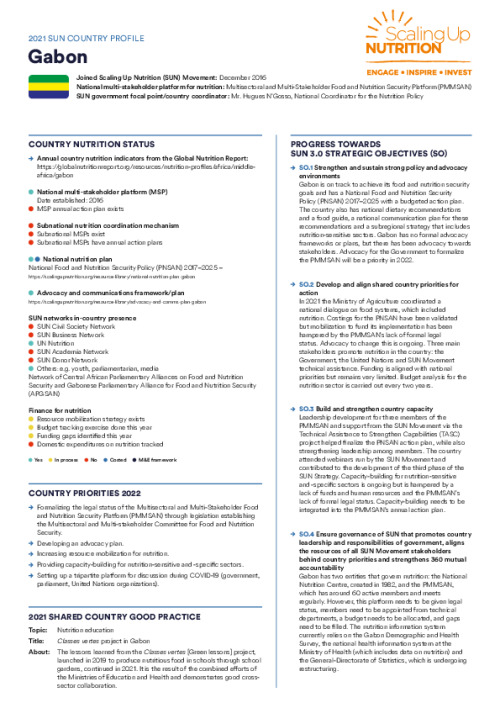
Gabon
Joined Scaling Up Nutrition (SUN) Movement
December 2016
National multi-stakeholder platform for nutrition
multi-sectoral and multi-actor platform for food and nutritional security (san-gabon platform)
Sun Government Focal Point/Country Coordinator
Hugues N'Gosso, Director General of Administrative and Financial Services / National Assembly, Ministry of Agriculture, Food Security, responsible for promoting rurality
Country nutrition status 2022
- Yes
- In process
- No
- Costed
- M&E framework
National multi-stakeholder platform (MSP)
National nutrition plan
Advocacy and communications framework/plan
Subnational nutrition coordination mechanism
SUN networks in-country presence
Finance for nutrition
Country priorities 2022
2022 Shared country good practice
Green Classes for innovative, recreational, educational and nutritious production
TCP on the Green Classes project bringing together three countries of the sub-region
The project was launched in three countries, including Gabon, to support the establishment of Green Classes to promote agricultural careers among young people, while improving the diet and nutritional status of participants.
Progress towards SUN 3.0 Strategic Objectives (SO)
This project failed to live up to expectations. However, we were able to participate in the World Summit on Food Systems, and we were able to observe a dense activity of parliamentarians in the other countries of the sub-region of the Economic Community of Central African States for the establishment of AP-SAN parliamentary alliance offices.
The country is on the way to achieving its main nutritional objectives at the national level (validation of the Common Results Framework and the National Policy Action Plan on Food and Nutrition Security; visibility of the activities of the Parliamentary Alliance on food and nutrition). However, it is important to finalise the validation of the Common Results Framework, action plan and costing in order to accelerate the implementation of the National Food and Nutrition Security Policy (PNSAN).
The SUN Movement can help Gabon implement the National Food and Nutrition Security Policy (PNSAN) through the finalisation of the Common Results Framework, Action Plan and associated costs, implementation strategy of the PNSAN Action Plan (mobilisation of funding, popularisation of the PNSAN) and capacity building of nutrition networks (youth, civil society, private sector, donors, researchers, parliamentarians, etc.)
Several State Ministries (health, agriculture, education, trade, industry, fishing, research, interior, economy, etc.) and organisations are involved in the governance of nutrition. There are also several policy documents that facilitate the acceleration of nutrition: the National Plan for Agricultural Investments and Food and Nutritional Security (PNIASAN), the PNSAN, national dietary recommendations, Common Results Framework, Action Plan for nutrition, etc. However, funding is still insufficient or non-existent.
